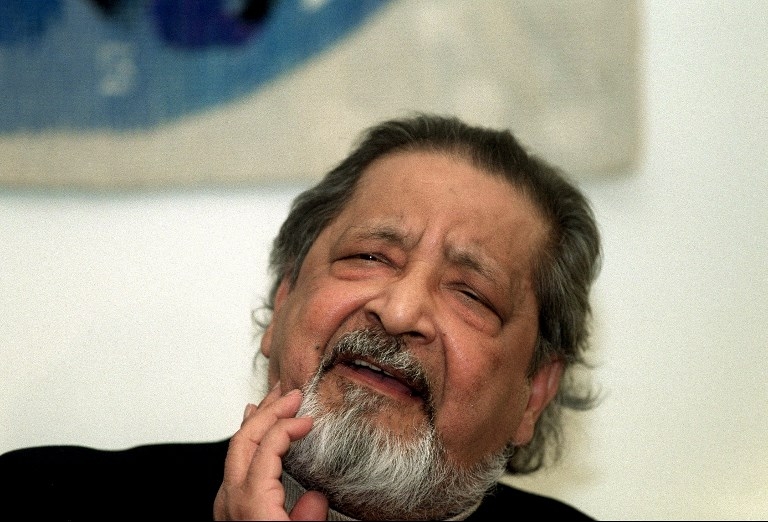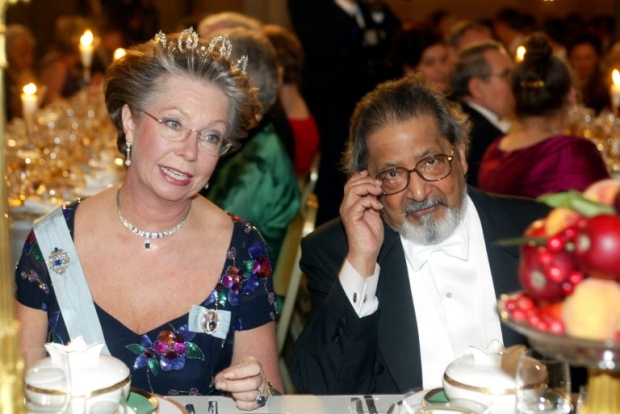The toxic legacy of VS Naipaul

VS Naipaul has died.
When the Trinidadian-British writer won the Nobel Prize for Literature in 2001, I wondered whether it was a historical coincidence that around the same time, Samuel Huntington’s ideas concerning “the clash of civilisations” - namely Western and Islamic civilisations - had become fashionable.
“The clash of civilisations will dominate global politics,” Huntington argued. “The fault lines between civilisations will be the battle lines of the future.”
Western policymakers today follow the same logic, treating “Islam” as a backwards entity in conflict with “the West”. This reductive, demagogic simplification appoints Islamic State (IS) leaders as spokespeople for Islam, and leaders such as US President Donald Trump and former UK Foreign Secretary Boris Johnson - but not the likes of US terrorist Timothy McVeigh - as spokespeople for the West.
Modernity versus traditionalism
Many of Naipaul’s novels reference the debate between modernity and traditionalism, leading to the conclusion that the “Third World” cannot preserve its traditional values in the modern world, and that colonised cultures tend to repudiate their traditions to mimic their colonial masters.
Naipaul insisted that the best intentions of recently decolonised countries ultimately amount to nothing, and whatever they have stems from the powers of illusion and European aid. The independence of “Third World” countries, according to Naipaul, eliminates the last hope of resistance to ignorance and the last civilising traces of western influence.
What remains in Naipaul’s Africa, in A Bend in the River for example, is only a greedy, consumptive desire and backwards cultural identities. In a racist response to a question about the continent's future, Naipaul responded: “Africa has no future.”
The independence of 'Third World' countries, according to Naipaul, eliminates the last hope of resistance to ignorance and the last civilising traces of western influence
A Bend in the River depicts a condemned, fragmented African society that lacks creative potential and cannot govern itself. It is the racist ideology of colonialism that justifies the occupation of other lands, and then defends the so-called human face of western colonialism.
Naipaul’s defence of neo-colonialism in terms of technology and industrialisation smacks of racism. To him, “Third World” peoples - Muslims and Africans in particular - are not genuine and authentic human beings, like Europeans and Americans, because they do not produce bombs and machines, but only consume them. In Beyond Belief, Naipaul maintains that Pakistanis are not genuine Muslims, and therefore are unable to preserve their values.
Africans ‘are nothing’
According to Naipaul, political and social disorder, frequently turning to chaos, are the unavoidable byproducts of contemporary liberation movements, with individual Africans, Muslims and Indians responsible for the tragedy in their lives. The opening of A Bend in the River, with its anti-evolutionary dimension, summarises the author’s ideology: “The world is what it is; men who are nothing, who allow themselves to become nothing, have no place in it.”
From its inception, Naipaul’s novel suggests that Africans are nothing and allow themselves to be nothing; they have no place in the world.
Naipaul’s Africans and Muslims are either obsessed with modernity and its technology, which they do not produce, or totally reject whatever is new and unfamiliar. African nations and other parts of the global south cannot, and will not, preserve their traditional values in the modern world. Instead, individuals and cultures tend to reject their traditional past and mimic the lives and cultures of their colonial masters (as in The Mimic Men).
This raises the question as to whether Naipaul’s consciousness is European or Indian or Trinidadian. Is his writing not directed to European readers? Who are his fans, besides the Swedish Academy?
Justifying neo-colonialism
For Naipaul, in the “Third World”, what seems intact is so because of the power of European aid; nothing useful can ever be done for the masses who betray whatever favours they receive. His African and Muslim characters are not only exiled from their past and traditions, but also from scientific and technological culture. They “have no means of understanding a fraction of the thought and science and philosophy and law that have gone to make that outside world”, Naipaul writes.
In Africa, Pakistan or India, it is either a chaotic society or a “wounded civilisation”. Older traditions constituting a national identity collapse, and what is left recedes into the bush, or into religious fundamentalism. Naipaul’s works of fiction and non-fiction justify neo-colonialism by seeing only bad qualities in the lives and cultures of newly decolonised countries. There is nothing in his postcolonial world except disease, filth, disgust, corruption and ignorance.
Worst of all are the racist statements interspersed throughout his works, such as the suggestion that Africans stink and “do not know how to live”, and that “the Arabs had only prepared the way for the mighty civilisation of Europe”. Africans have an inferior mentality to Europeans, as is written in A Bend in the River: “We couldn’t make the things we dealt in; we hardly understood their principles. Money alone had brought these magical things to us deep in the bush, and we dealt in them so casually!”
In London, some Arabs are in the habit of pissing in the lift, and when Naipaul goes back to India “in search of his roots”, all he sees are people defecating on the streets, he writes in India: A Wounded Civilization.
Racial arrogance
For all these primitive, uncivilised attitudes, the white man should be generous enough to carry the burden of bringing civilisation to those uncivilised peoples, since not all the enlightened intellectuals there can emigrate as Naipaul did. The source of order comes from the civilised outside, the West. The message is clear: since you cannot trust “Third World” peoples in the development of their newly independent countries, as they merely consume what they do not produce, they should welcome more European expatriates.
By offering him the Nobel Prize, the Swedish Academy, not innocently, gave creedence not only to neo-colonialism, but also to racial arrogance disguised by brown skin
VS Naipaul, the writer who had a problem with the colour of his own skin, is dead - yet I will never forget the pain I endured reading his novels in preparation for my Masters degree. In his work could be found a toxic cocktail of 19th century racial ideology mixed with sexism, Islamophobia and Orientalism.
He was, as Tariq Ali put it, "completely bewitched" by the "classical heritage of the European bourgeoisie". Or, as Vijay Prashad tweeted: "Naipaul is dead. He wrote a great novel (House for Mr Biswas), but was otherwise a really unpleasant person".
By offering Naipaul the Nobel Prize, the Swedish Academy, not innocently, gave creedence not only to neo-colonialism, but also to racial arrogance disguised by brown skin.
- Dr Haidar Eid is an associate professor in the department of English literature at Al-Aqsa University in the Gaza Strip.
The views expressed in this article belong to the author and do not necessarily reflect the editorial policy of Middle East Eye.
Photo: British writer VS Naipaul gives a press conference in advance of receiving the Nobel Prize for Literature on 6 December 2001 in Stockholm, Sweden (AFP)
New MEE newsletter: Jerusalem Dispatch
Sign up to get the latest insights and analysis on Israel-Palestine, alongside Turkey Unpacked and other MEE newsletters
Middle East Eye delivers independent and unrivalled coverage and analysis of the Middle East, North Africa and beyond. To learn more about republishing this content and the associated fees, please fill out this form. More about MEE can be found here.






